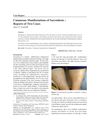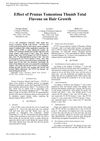 December 2018 in “Neuroradiology”
December 2018 in “Neuroradiology” MRI helps distinguish between pituitary adenomas and craniopharyngiomas, guides treatment for pediatric CNS tumors, and assesses rhinocerebral mucormycosis with a high mortality rate in transplanted patients.
 March 2018 in “Surgical and Radiologic Anatomy”
March 2018 in “Surgical and Radiologic Anatomy” High-resolution imaging is crucial for diagnosing and planning treatments in clinical anatomy and aging.

Early NAS level changes affect alcohol consumption vulnerability.
 March 2017 in “BIRDEM Medical Journal”
March 2017 in “BIRDEM Medical Journal” Sarcoidosis can cause various skin issues, making diagnosis difficult.
 January 2017 in “Acta dermato-venereologica”
January 2017 in “Acta dermato-venereologica” The congress showed that psychological therapy can help skin condition patients, social media affects acne stigma, education improves atopic dermatitis, and patient satisfaction in dermatology is high, especially with good doctor engagement.
 January 2017 in “Elsevier eBooks”
January 2017 in “Elsevier eBooks” Stress and hormones like progesterone can affect absence seizures, but their effects change with different life stages.
 September 2016 in “Princeton University Press eBooks”
September 2016 in “Princeton University Press eBooks” The document concludes that understanding health requires considering evolutionary perspectives on reproductive fitness, and recognizing the complexity of factors like diet, testosterone, and sexual orientation.

Proper care and understanding of skin diseases in pregnant women are crucial for their health and recovery.
 September 2013 in “Regenerative Medicine”
September 2013 in “Regenerative Medicine” γδ T cells help with hair growth during wound healing in mice.

Patients with lichen planus should be tested for hepatitis C.

The document explains how to measure sales and marketing success and warns about misusing these measurements.

Prunus Tomentosa extract is effective in promoting hair growth, similar to minoxidil.

Type II spiral ganglion neurites avoid high concentrations of laminin and fibronectin.
 June 2019 in “Brain Imaging and Behavior”
June 2019 in “Brain Imaging and Behavior” Hair loss can indicate brain aging and potential small vessel disease, but more research is needed to understand the clinical impact.
6 citations,
September 2018 in “ACS applied bio materials” Calcium fatty acid deposits found in human hair can change its appearance and feel.
13 citations,
January 2014 in “Journal of Veterinary Internal Medicine” The cat's hypothyroidism was successfully managed with levothyroxine, leading to a stable condition.
5 citations,
April 2016 in “PubMed” Cetuximab often causes skin problems, but they can be managed without stopping treatment.
4 citations,
January 2019 in “Tropical animal health and production”  December 2013 in “미용예술경영연구”
December 2013 in “미용예술경영연구” Scalp treatments increased hair density and reduced hair loss in Telogen Effluvium patients.
949 citations,
January 2001 in “Cell” Adult mouse skin contains stem cells that can create new hair, skin, and oil glands.
550 citations,
December 2005 in “The Journal of clinical investigation/The journal of clinical investigation” Researchers successfully isolated and identified key markers of stem cell-enriched human hair follicle bulge cells.
172 citations,
March 2019 in “The EMBO Journal” FERONIA and LRX proteins help control cell growth in plants by regulating vacuole expansion.
 154 citations,
November 2017 in “Development”
154 citations,
November 2017 in “Development” Fibroblast Growth Factors (FGFs) are important for tissue repair and regeneration, influencing cell behavior and other factors involved in healing, and are crucial in processes like wound healing, bone repair, and hair growth.
140 citations,
February 2014 in “Neuron” Delta opioid receptors help regulate touch sensation by reducing neurotransmitter release in the spinal cord.
126 citations,
August 2018 in “Molecular Systems Biology” Fibroblast state switching is crucial for skin healing and development.
119 citations,
December 2008 in “The journal of investigative dermatology/Journal of investigative dermatology” Nanoparticles can deliver vaccines through hair follicles, triggering immune responses and providing protection.
96 citations,
April 2017 in “Oncotarget” Smaller nanoemulsions can penetrate skin and hair follicles better, which may be useful for delivering drugs and vaccines through the skin.
71 citations,
January 2012 in “PloS one” The conclusion is that genetic differences affect how the cochlea heals after hair cell loss, which may challenge the creation of hearing loss treatments.
71 citations,
May 2006 in “The journal of investigative dermatology/Journal of investigative dermatology” TTD hair brittleness is caused by multiple structural abnormalities.
62 citations,
December 2007 in “Journal of biological chemistry/The Journal of biological chemistry” A specific chemical change in the S100A3 protein leads to the formation of a four-part structure important for hair formation.















